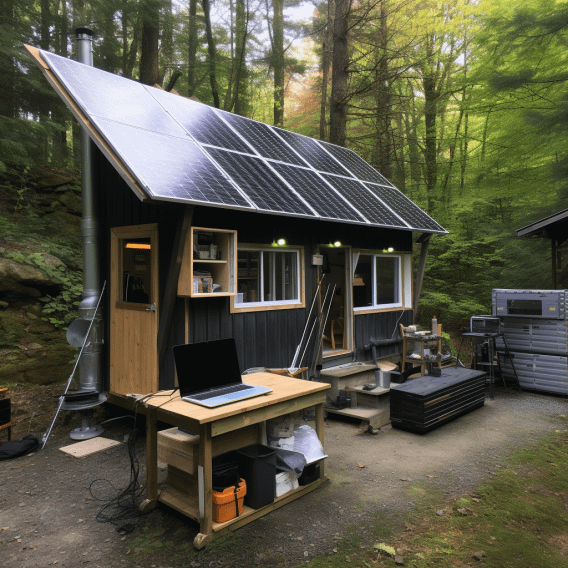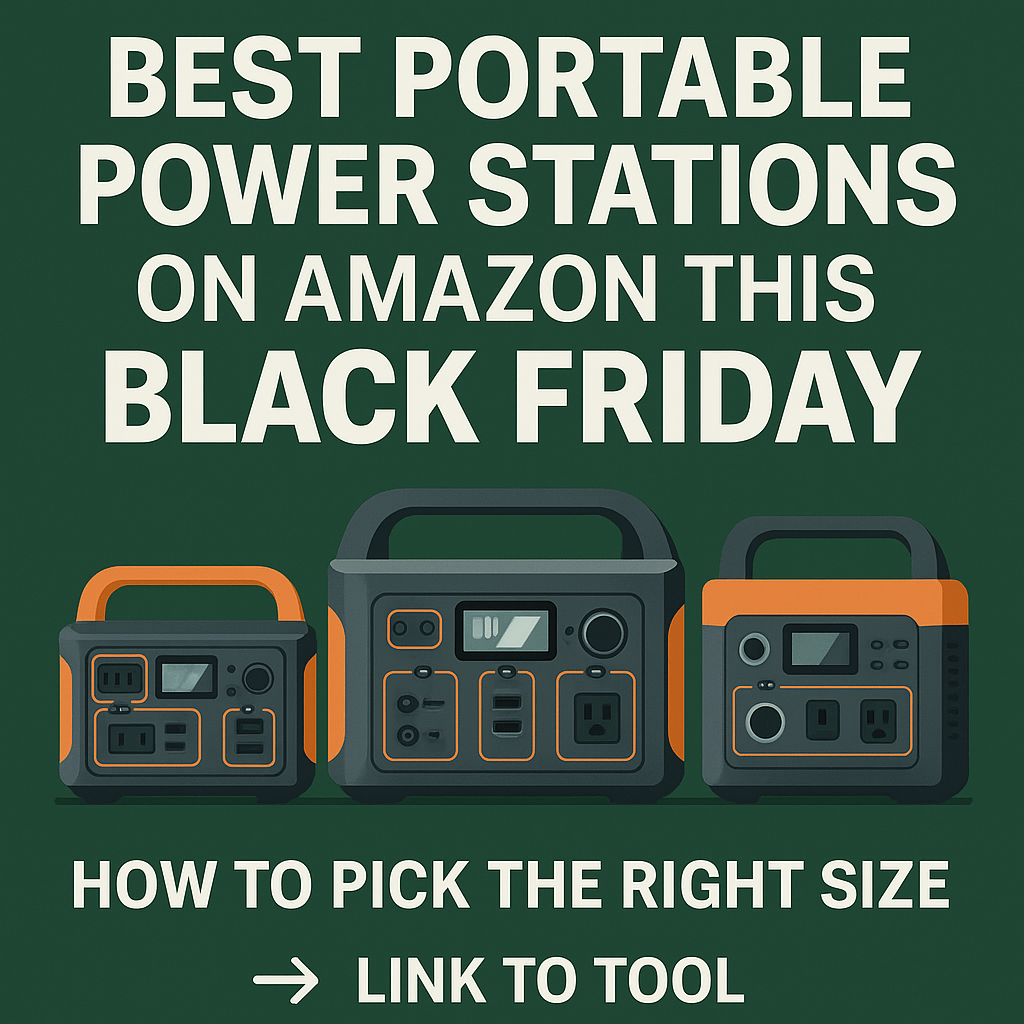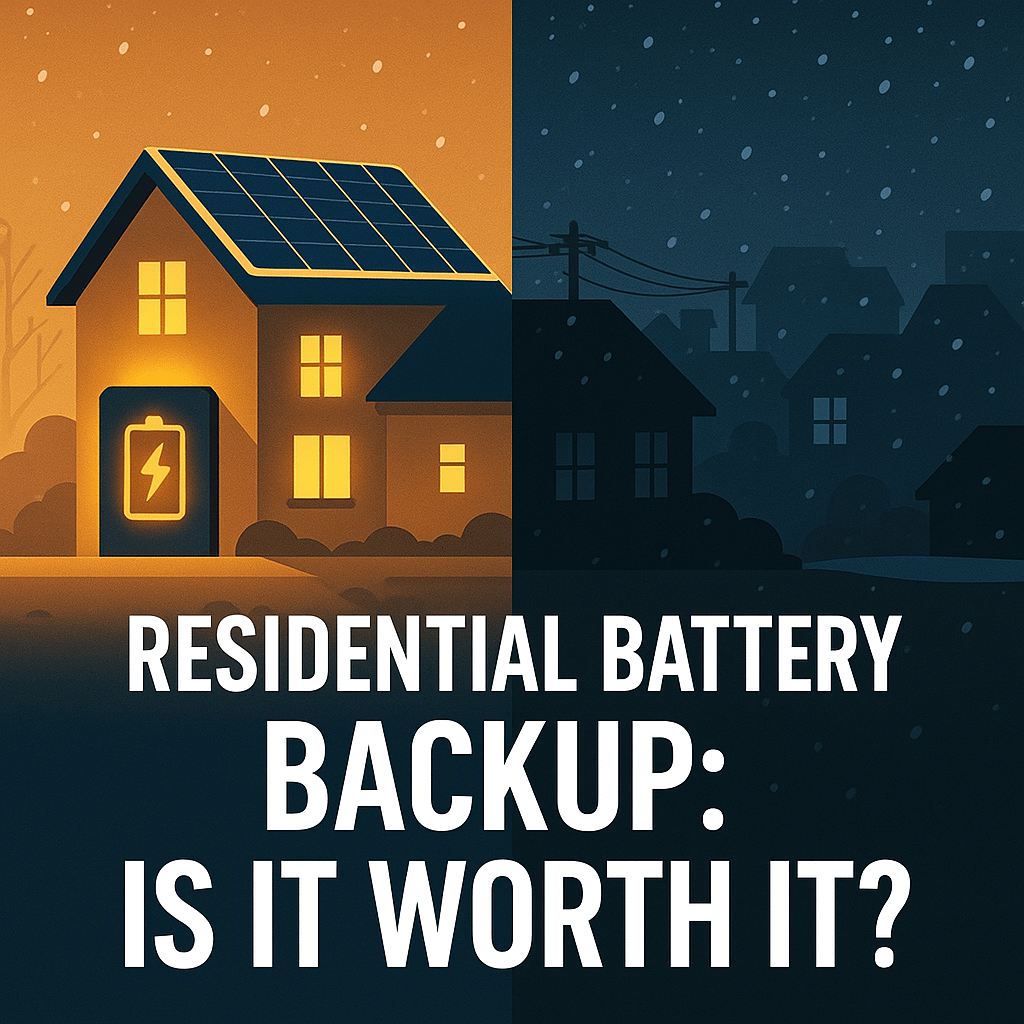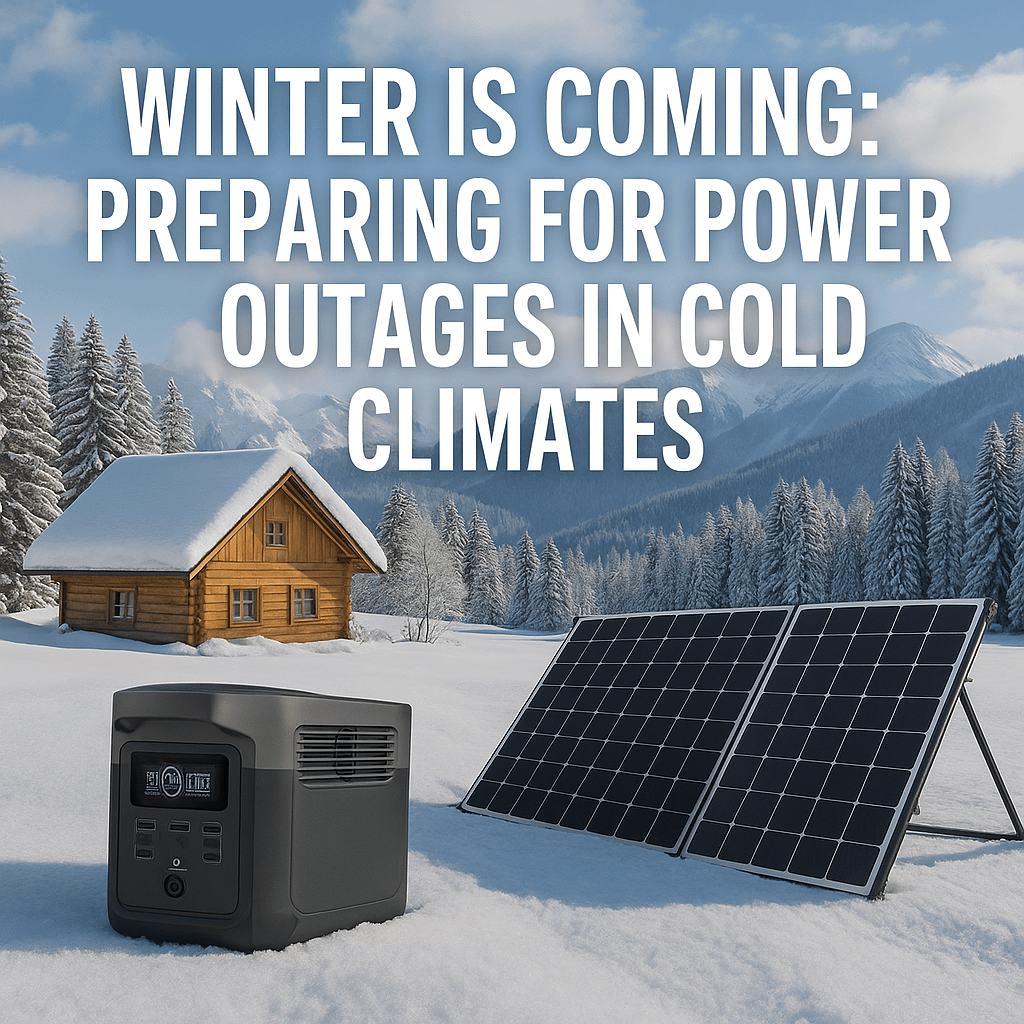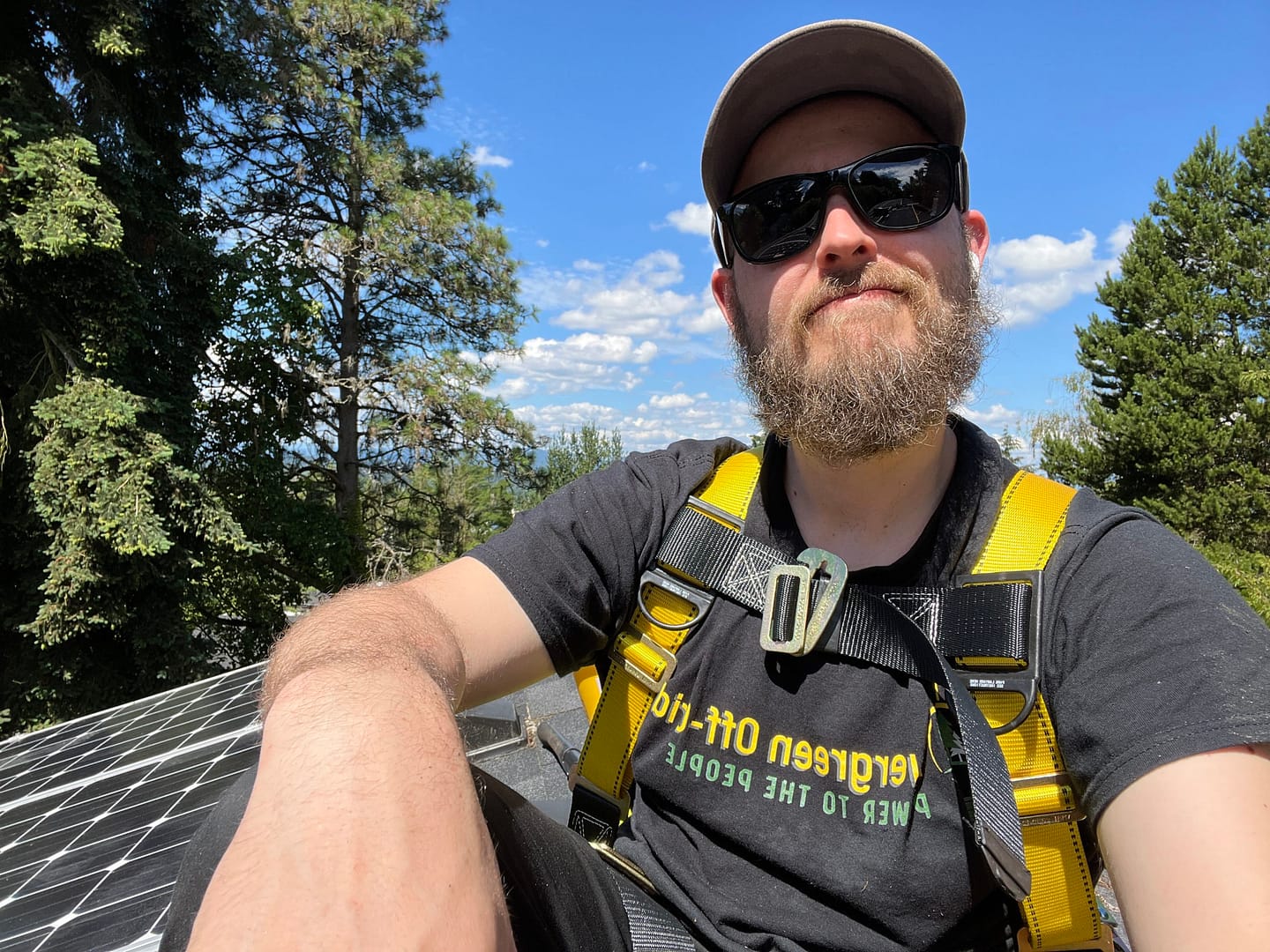Welcome to Evergreen Off-Grid, your go-to destination for all things DIY solar. In this blog article, we dive deep into the world of inverters, with a specific focus on “pure” sine wave inverters. As renewable energy and off-grid living gain popularity, it’s crucial to understand the importance of selecting the right inverter for your unique power needs. Join us as we explore the significance of pure sine wave inverters and provide valuable insights to help you make an informed choice.
Stay tuned and we’ll guide you through the process of choosing the best inverter for your specific requirements. Whether you’re a seasoned solar enthusiast or new to the off-grid world, this article will equip you with the knowledge to make an informed decision. Let’s explore the world of pure sine wave inverters and unlock the potential of reliable, clean energy for your off-grid adventures.
This article is part of Evergreen Off-Grid’s AI Assist blog category. To filter out this category, find our uniquely human insights here.
Evergreen Off-Grid generated this article in part with GPT-4, OpenAI’s large-scale language-generation model. After uploading samples of our work and prompting for our desired output, Evergreen Off-Grid reviewed, edited, and revised the language to our liking and we take ultimate responsibility for the content of this publication.This disclaimer will appear on all of our content assisted with AI.

Understanding Inverters
For a deeper dive on inverters check out our previous article: How to Size your Solar System Inverter. But for the purposes of this article, we’ll give you the highlights.
Inverters play a vital role in off-grid solar systems by converting direct current (DC) power generated from solar panels or stored in batteries into alternating current (AC) power, which is the standard form of electricity used in households and most electrical appliances. This conversion enables off-grid users to power their homes, cabins, vans or other dwellings with solar energy, even when they are disconnected from the traditional power grid.
Explanation of the Difference between Pure Sine Wave and Modified Sine Wave Inverters:
When it comes to choosing an inverter for your off-grid solar system, understanding the difference between pure sine wave and modified sine wave inverters is crucial.
Pure Sine Wave Inverters: Pure sine wave inverters produce an electrical output that replicates the smooth, undulating waveform of utility-grade AC power (see figure below). They deliver a clean and consistent flow of electricity, similar to what you would receive from a standard power outlet in your home. Pure sine wave inverters are designed to power a wide range of devices, including sensitive electronics such as laptops, televisions, medical equipment, and other appliances that require high-quality AC power. They are highly efficient and provide reliable performance, making them the preferred choice for most off-grid applications.


Modified Sine Wave Inverters: Modified sine wave inverters, on the other hand, generate an approximation of the AC waveform using a stepped waveform. The output of a modified sine wave inverter consists of a series of square waveforms, which are not as smooth and consistent as the pure sine wave (see figure below). While modified sine wave inverters are generally more affordable, they may not be suitable for certain types of devices. Some appliances, particularly those with sensitive electronics or motors, may experience reduced performance or produce audible buzzing or heating issues when operated with a modified sine wave inverter.
It is important to note that the choice between pure sine wave and modified sine wave inverters depends on the specific requirements of your off-grid system and the devices you intend to power. If you have sensitive electronics or appliances that require high-quality AC power, a pure sine wave inverter is recommended to ensure optimal performance and longevity of your equipment. In fact, there aren’t many situations I would really recommend a modified sine wave inverter. For that reason, we only offer pure sine wave inverters on our DIY Marketplace.
What Size Inverter do I Need?!
I would again point you to our previous article for a deeper dive on this: How to Size your Solar System Inverter, but once again, we’ll boil it down for you and try to make this simple.
Choosing the right size inverter for your off-grid solar system is crucial to ensure efficient and reliable power generation. Here are some key factors to consider when determining the appropriate size of the inverter:
- Load Calculations: Start by assessing the power requirements of the appliances and devices you intend to power with the inverter. Make a comprehensive list of all the loads you expect to operate simultaneously. Note down their power ratings in watts or kilowatts. Consider both the continuous power required to run the devices and any additional surge power needed during startup. This will give you an estimate of the total power (wattage) your inverter should be capable of handling. This is a critical exercise for inverter sizing. Think of the inverter as the component in your system that determines how much power you can use at one time. If you only need to power small electronics, such as TVs and tablets, a small 700 to 1000 Watt inverter will do. But if you want to cook or power your heating and cooling needs, a much larger inverter would be in order.
- Surge Power Requirements: Many appliances, especially those with motors or compressors, require an initial surge of power when they start up. Think refrigerators, air conditioners, large power tools, etc. This surge power can be several times higher than the appliance’s continuous power rating. Take into account these surge power requirements when selecting an inverter. Ensure that the inverter you choose can handle the peak power demands of your appliances during startup to avoid potential overload or inverter failure. When you look at an inverter power rating you will see two values, a lower value which tells you how much power it can continuously handle; and this higher rating, or surge power capacity, which tells you how much increased power the inverter can handle for short durations.
- Future Expansion Considerations: Consider your future power needs and any plans for system expansion. If you anticipate adding more appliances or expanding your off-grid system in the future, it’s advisable to choose an inverter with a higher power rating than your current requirements. This will provide flexibility and allow room for future growth without the need to replace the inverter. Considering the cost of inverters and the relatively low cost of upsizing, it often makes sense to give yourself extra “room” when it comes to selecting an inverter.
- Inverter Efficiency: Take into account the efficiency of the inverter. Inverters have varying efficiency levels, with some models being more efficient than others. Higher efficiency means more of the power you are generating is used for it’s intended purpose. Look for inverters with high efficiency ratings to maximize the utilization of your solar power.
- Safety Margins: It is recommended to incorporate safety margins when sizing your inverter. This involves selecting an inverter with a power rating slightly higher than your estimated load requirements. By providing a buffer, safety margins account for unforeseen power spikes or future additions to your load. It helps ensure that your inverter operates within its optimal range and avoids running near its maximum capacity, which can reduce its efficiency and longevity. I’ve frequently heard from folks wondering why their system keeps tripping off. Often, an undersized inverter can be the culprit.
By carefully considering load calculations, surge power requirements, future expansion plans, efficiency, and safety margins, you can determine the appropriate size of the inverter for your off-grid solar system. This ensures that your system operates smoothly, providing reliable and efficient power to meet your energy needs.
Power Unleashed: Top Inverter Picks for Your Off-Grid Solar Adventure
Now that you understand the factors involved in sizing your inverter, let’s explore some standout options that can meet your off-grid power needs. We’ve handpicked two remarkable Victron inverters, along with a powerful 2000W Newpowa inverter. Additionally, we’ll introduce a standout model from Renogy, each with unique features and applications.
Victron Inverters: Unleash the Power with Reliability
When it comes to off-grid power solutions, Victron Energy has established a strong reputation for its exceptional inverters. In this section, we shine a spotlight on the Victron Energy Phoenix, a remarkable inverter renowned for reliability and outstanding performance. Let’s explore the key features, specifications, and the versatile applications that make Victron inverters a top choice for off-grid enthusiasts.
The Victron Energy Phoenix represents the pinnacle of inverter technology, delivering clean and stable power with its pure sine wave output. These inverters ensure a consistent flow of electricity, making them compatible with sensitive electronics and appliances. The Victron inverters boast high peak power and efficiency ratings, enabling them to handle demanding power needs efficiently and reliably.
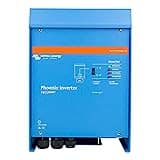
Victron Energy Phoenix 3000VA 24-Volt 120V AC Pure Sine Wave Inverter
$1,282.65
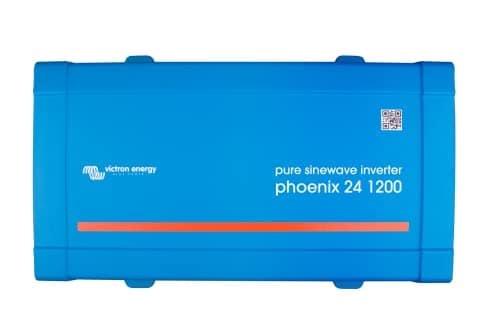
Victron Energy Phoenix 1200VA 24-Volt 120V AC Pure Sine Wave Inverter
$328.95
Versatility and Suitability for Various Applications
Victron inverters are synonymous with reliability and excellence and are designed to excel in a wide range of off-grid applications. Whether it’s for residential, commercial, or industrial needs, these inverters can deliver the required power with utmost reliability. In residential settings, Victron will power essential household appliances, lighting systems, and electronics. For commercial and industrial scenarios, such as remote worksites or mobile applications like food trucks or ambulances, Victron inverters provide the reliable power source necessary to keep operations running smoothly.
With Victron inverters, you can unleash the power of clean energy with confidence. Their pure sine wave output ensures optimal performance and longevity for your sensitive devices. The high peak power and efficiency ratings guarantee efficient power conversion, reducing energy loss and maximizing the utilization of your solar power.
Experience the reliability and performance of Victron inverters by following our affiliate links above. Explore the full range of Victron products and discover the perfect solution to meet your off-grid power needs. Unleash the power with Victron inverters and enjoy the peace of mind that comes with reliable, clean energy for your off-grid lifestyle.
Newpowa 2000W Inverter: Power Your Ambitions
For off-grid power enthusiasts seeking a quality inverter with a smaller price tag, the Newpowa 2000W inverter is a robust choice that delivers exceptional performance. With its impressive 2000W continuous output and 4000W surge power capacity, this inverter enables the use of large electronic appliances and devices with ease.
The Newpowa 2000W inverter is designed to efficiently convert 12V power into usable home AC and USB current, making it an ideal solution for various off-grid applications. Whether you’re camping, facing an emergency situation, or working at a job site, this inverter ensures that you have reliable power for your essential devices.
With its 2000W continuous output, the Newpowa inverter provides ample power to run a wide range of appliances, tools, and equipment. From refrigerators and power tools to air conditioners and other energy-demanding devices, this inverter can handle them all. Its high surge power capacity of 4000W enables safe startup of power-hungry appliances, ensuring a smooth and reliable operation.
One of the key advantages of the Newpowa inverter is its ability to efficiently convert vehicle power into usable AC and USB current. This makes it a valuable companion for camping trips, where you can power your electronic devices and appliances while enjoying the beauty of the outdoors. In emergency situations, the Newpowa inverter provides a reliable backup power source to keep your essential devices running. Additionally, it proves invaluable on job sites, where access to reliable power is essential for running tools and equipment.
The Newpowa 2000W inverter combines power and efficiency, making it a versatile solution for off-grid power needs. Its robust performance, combined with its ability to convert vehicle power into usable home AC and USB current, ensures that you have the power you need, wherever you may be.
Visit our affiliate link above and explore the Newpowa 2000W inverter and discover other high-quality products that will help you achieve your off-grid power goals. Power your ambitions with the reliability and performance of the Newpowa inverter.
Renogy 3000W 12V Pure Sine Wave Inverter: Embrace Reliable Power
Introducing the Renogy 3000W Pure Sine Wave Power Inverter, the perfect addition to any off-grid system, be it a van or a cabin. This high-performance inverter serves as a DC to AC converter, providing the ability to power your household appliances seamlessly. The Renogy 3000W inverter boasts a pure sine wave output, ensuring clean, smooth, and reliable electricity to operate your tools, fans, lights, and other electronics without interference.

Renogy 3000W 12V Pure Sine Wave Inverter
$579.99 Original price was: $579.99.$359.99Current price is: $359.99.
Designed to meet the specific needs of off-grid systems, this 12V solar inverter offers multiple protections to ensure safe and efficient operation. With these protections in place, you can rest assured that your system will run smoothly, safeguarded against overvoltage, undervoltage, overload, and overheating. The Renogy 3000W inverter prioritizes the reliability and longevity of your devices.
Equipped with a wired remote, this inverter provides convenient control over its operation. The remote allows you to easily turn the inverter on or off, putting the power at your fingertips. Additionally, the included AC hardwire port simplifies the process of wiring the inverter to an AC distribution box, providing a seamless connection for your off-grid power setup.
Renogy’s commitment to quality and innovation shines through in the design of this 3000W pure sine wave inverter. With its advanced features and reliable performance, it becomes the ideal choice for powering your off-grid adventures. Whether you’re embarking on a cross-country road trip in your van or seeking a sustainable energy solution for your cabin, the Renogy 3000W inverter delivers the power and reliability you need.
Visit our affiliate link above to explore the Renogy 3000W 12V Pure Sine Wave Inverter and other high-quality products. Experience the seamless and interference-free electricity provided by this inverter, allowing you to enjoy the full potential of your off-grid lifestyle. Embrace reliable power with the Renogy 3000W inverter and embrace the freedom of off-grid living.
Unleash Your Solar Potential with Evergreen Off-Grid
Ready to embark on your off-grid solar journey? Look no further than Evergreen Off-Grid’s solar marketplace, your ultimate destination for all your DIY solar needs. We take pride in curating a wide range of high-quality products that will power your off-grid lifestyle with efficiency and reliability.
At Evergreen Off-Grid, we understand the importance of empowering our customers with knowledge. That’s why we offer the Learn Solar blog series, a treasure trove of valuable resources and guides specifically tailored for solar enthusiasts like you. Whether you’re a seasoned solar expert or just starting on your renewable energy journey, our Learn Solar blog series provides insights, tips, and step-by-step instructions to help you navigate the world of solar power with confidence.
Visit our solar marketplace and explore the extensive selection of products that cater to your off-grid power needs. From inverters to solar panels, batteries to charge controllers, we’ve got you covered. We meticulously curate our offerings to ensure that you have access to reliable, well regarded, high-performance products that will meet your unique requirements.
Special Announcement!
To show our appreciation, the first 10 readers to leave a relevant comment in a post in the Learn Solar blog series will receive a free 1st edition copy of our book, “Power to the People: The Ultimate DIY Solar Guide for Energy Independence.” This comprehensive guide covers everything you need to know to harness the full potential of solar energy and achieve true energy independence.
POWER TO THE PEOPLE: THE ULTIMATE DIY SOLAR GUIDE FOR ENERGY INDEPENDENCE!
$10.99
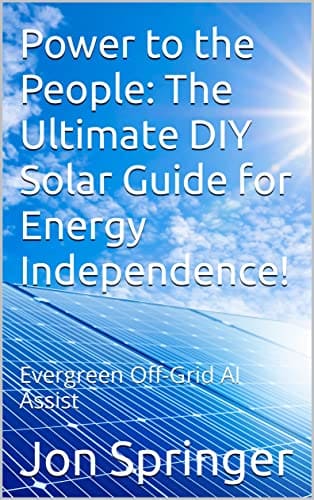
Don’t miss out on the opportunity! Simply post a relevant comment on any post in our Learn Solar Blog series, then send me an email at info@evergreenoffgrid.com with your shipping address and we’ll mail it anywhere in the Continental United States for FREE! Discover the tools, knowledge, and resources you need to unleash your solar potential and embrace the freedom of off-grid living.

